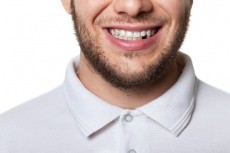Germany’s largest doctor-patient portal
Tooth broken off but no pain – what can I do??

A piece of tooth has broken off? Do not hesitate with the treatment! (© Fotolia-BillionPhotos.com) It is an uncomfortable moment and unfortunately it always happens: A tooth breaks off. Despite the initial shock and for no apparent reason, it happens very painlessly. What to do?
What can I do if my tooth has broken off??
Those affected should not hesitate for long. If possible, pick up the broken piece and pick up the phone. You should make an appointment with your dentist as soon as possible and report the incident on the phone. If you still have the broken tooth, keep it in a damp environment – ideally in milk or in a saline solution. This applies if you notice the incident immediately. However, it often happens that only a small corner breaks off.




